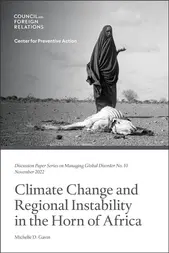Sub-Saharan Africa
Somalia
-
Somaliland: The Horn of Africa’s Breakaway StateThe would-be independent state stands in contrast to Somalia as a place of relative stability, and despite its lack of international recognition, Somaliland continues to push its own foreign policy.
-
Tensions Rising in the Horn of AfricaIn the Horn of Africa, the time is now for preventative diplomacy.
-
New Deals Open Old Wounds in the Horn of AfricaAn already tense security environment in the Horn of Africa is growing even more perilous.
-
What Climate Change Means for the Horn of Africa, With Michelle GavinMichelle Gavin, the Ralph Bunche senior fellow for Africa policy studies at the Council, sits down with James M. Lindsay to discuss the impact of climate change in the Horn of Africa. This series is made possible by a grant from the Carnegie Corporation of New York.
-
Al-ShabaabAl-Shabaab remains capable of carrying out massive attacks in Somalia and nearby countries despite a long-running African Union offensive against the Islamist terrorist group.
-
Climate Change and Regional Instability in the Horn of Africa
![]() Climate change is exacerbating instability in the Horn of Africa. Democratizing climate awareness, respecting African energy needs, and supporting regional organizations are strategies to mitigate its effects.
Climate change is exacerbating instability in the Horn of Africa. Democratizing climate awareness, respecting African energy needs, and supporting regional organizations are strategies to mitigate its effects.
-
Stranded Somali Soldiers Raise Questions About Horn AlliancesEritrean interests may be better served than those of Ethiopia and Somalia.
-
Jendayi Frazer on the Search For Multilateral ConsensusFormer Assistant Secretary of State for African Affairs of the United States Jendayi Frazer speaks about the evolution of U.S. policy toward Somaliland.
-
Somalia’s Political Paradoxes Forestall Progress and StabilitySomali politicians use nationalism to evade political pressure that seeks to create a more accountable and effective state.
-
Al-Shabaab in East AfricaWith brazen terrorist attacks at home and abroad, the Somalia-based Islamist insurgent group has proved resilient despite strategic setbacks in recent years.
-
Authoritarian Trends in the Horn of Africa Require New Policy ApproachU.S. policy has been largely ineffectual in reversing democratic backsliding in the Horn of Africa.
-
U.S. Policy in Africa Should Reflect Renewed Commitment to DemocracyAmerican policy in Africa has not always empowered those fighting on behalf of democracy—and sometimes even supports anti-democratic forces—taking away from its stated aim of promoting democracy abroad.
-
Somalia’s Ongoing Political Crisis Exposes Fundamental Problem for U.S. PolicyReflections on the shortcoming of U.S. policy in Afghanistan have brought lessons that can be used to rethink American policy toward Somalia.
-
United States Names Five African Jihadis as Specially Designated Global TerroristsThe practical consequences of the U.S. Department of State adding five terrorist leaders operating in Africa to the list of Specially Designated Global Terrorists is likely to be limited.
-
Recognizing Somaliland's Democratic SuccessOn May 31st, the people of Somaliland went to the polls to participate in long-delayed parliamentary and municipal elections.
 Online Store
Online Store
